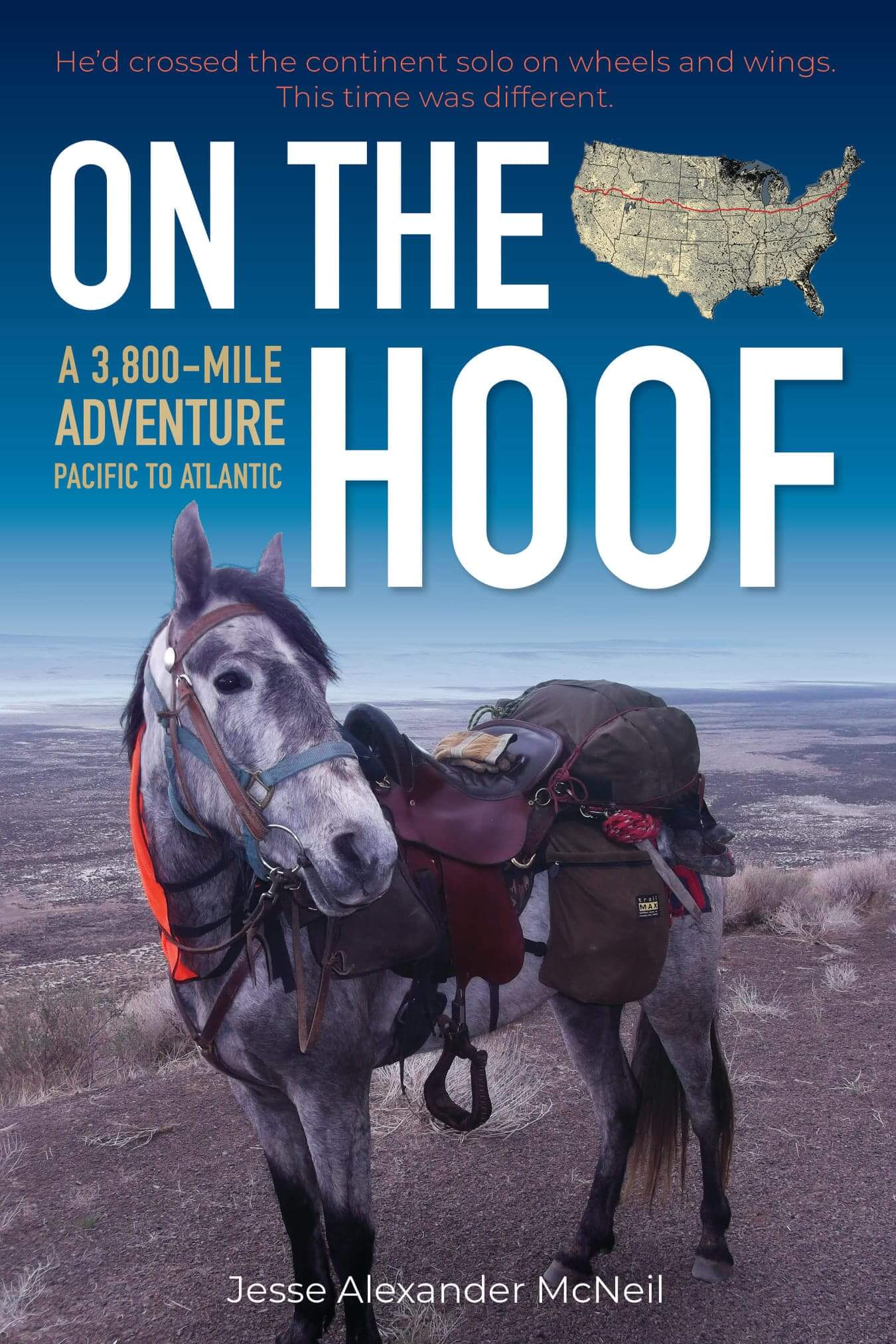
Review
On the Hoof: Traversing the Country and the Mind via the Human-Animal Bond
Review by Al Dickenson
On the Hoof: Pacific to Atlantic, A 3,800-Mile Adventure
By Jesse Alexander McNeil
Trafalgar Square Books
ISBN: 9781570769771
Jesse Alexander McNeil presents On the Hoof as a story of self-discovery and a tale of man (and horse) against nature. The book’s premise is that McNeil takes his new horse, Pepper, a largely untrained mount, and combines that with his inexperienced horsemanship prowess on a cross-country adventure throughout the northern United States. Starting on the sandy, cold beaches of Oregon’s Pacific coast and crossing the country to the cold and rocky beaches of New Hampshire, through painful injuries and heartrending news, McNeil consistently encapsulates the human aspect of such a worldly journey.
If readers are interested in examining the relationship between humans and horses or are intrigued by stories of human survival, this text will serve them well. As someone who has worked closely with the equine industry, I can say that this text also can serve as an introduction to the work and purposes of farriers, feed stores, and equine supply centers, as well as the equipment required to operate a horse for riding and packing successfully.
In many ways, this volume is a nonfiction version of Ernest Hemingway’s The Old Man and the Sea, though McNeil tends to be more verbose than “Papa.” Perhaps McNeil’s work is a little more reminiscent of George Orwell’s essay “To Shoot an Elephant.” In both works, there is a sense of realism and danger, and both pieces also spend a portion of their time on the story’s periphery, detailing the reactions and perspectives of bystanders and onlookers in their writing. Orwell’s essay and McNeil’s memoir are both easy reads, with McNeil’s writing style being conversational with snippets of action throughout.
On the Hoof also provides a glimpse into the past, where travelers would ride their horses across great distances for adventure, prosperity, and to test their endurance. While in Nebraska, the home of the Pony Express, McNeil illustrates how difficult it would have been for those horsemen in the 1800s to get their messages through to the West. Though the Express ran for less than two years, riders were pushed hard to get the mail and messages from the Midwest to the far western states, often in just days. When McNeil was passing through some of Nebraska’s towns and landmarks, like Guernsey, Wendover Canyon, and Register Cliff, he was already months into his journey at this point, which offers a unique comparison with the Pony Express riders. McNeil’s historical comparison may be of interest to those dedicated to sharing the experiences of the past, but it also provides a level of thoughtfulness regarding history and past lives rarely seen in modern literature.
McNeil’s story is also one of endurance. One passage from the book speaks to this particularly well: “We ride far off the road, hemming the tree line. We pass a sign by a highway underpass: New York City 81… It’s getting harder to keep all the miles straight” (344). Though McNeil is only eighty miles away from the country’s largest city, he is alone. It doesn’t matter if McNeil was on the doorstep of a sprawling metropolis or in the middle of Iowa’s cornfields, his reliance must be on himself and his horse. In this sense, the comparisons to works by Orwell and Hemingway are even more clearly delineated, illustrating that human-animal bond once again. Though contrary to Hemingway’s Old Man, Santiago, and the giant marlin he so desperately needs to catch and sell, McNeil’s work is a (mostly) pleasant relationship with his horse, Pepper, though both men often see their dreams crushed, or at least disappointed. Like Santiago, McNeil had to bond with Pepper, as it was his sole method of survival. Had it not been for her company, McNeil likely would not have made his journey beyond western Oregon, where he started.
McNeil had to possess a great deal of physical endurance to travel from one end of the country to another on horseback, but he also needed mental discipline. Otherwise, he would lose focus. Mental fortitude is one of the book’s main themes. Through eight months of travel, McNeil interacts with other people, but he is without close confidants, even though he gradually begins to treat Pepper as someone closer than a friend. Not being able to share your fears and desires can take a toll on a person, and Pepper, while she can listen, cannot reply. When McNeil hears word that one of his close friends has died weeks earlier, and a funeral happened without him, he almost gives up his journey, but his friends’ memory propels him forward (249). By mentioning his mental health struggles throughout, McNeil gives readers an accurate look at his journey across the United States and his own emotions. This window into McNeil’s life provides insight into our own thought processes when we are focused on a task and experience setbacks and obstacles.
In all, On the Hoof was an enjoyable read, immersing readers into McNeil’s world of nature and loneliness while also exploring his bond with Pepper, his horse. Though the book was periodically redundant, there was an appeal to seeing the emotional and mental process McNeil went through to travel from the Pacific Ocean to the Atlantic Ocean on horseback. Overall, McNeil’s On the Hoof serves as a good addition to literary non-fiction and travel literature in general, and more specifically, a good addition to the literature on human-animal bonds. Without Pepper, McNeil would have simply been another wanderer in the New World.
About the Author
 Al Dickenson works as a writer, marketer, archivist, and historian in Milwaukee, Wisconsin, his hometown, where he lives with his wife. He has been published in Sage Scholars Newsroom and The Journal of the American Revolution in 2022 and their 2023 annual volume (forthcoming), among other outlets. More of Al’s work can be found at adickensonwriting.wordpress.com.
Al Dickenson works as a writer, marketer, archivist, and historian in Milwaukee, Wisconsin, his hometown, where he lives with his wife. He has been published in Sage Scholars Newsroom and The Journal of the American Revolution in 2022 and their 2023 annual volume (forthcoming), among other outlets. More of Al’s work can be found at adickensonwriting.wordpress.com.



